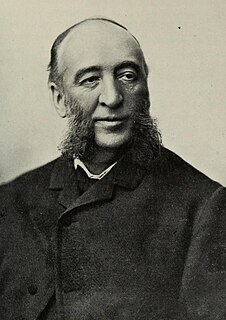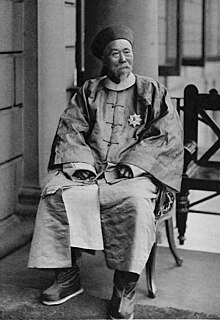 W
WFeng Zicai (1818–1903) was a general in the Imperial Army during the Qing dynasty. He was originally a bandit from Qinzhou, Guangxi, China.
 W
WJules François Camille Ferry was a French statesman and republican philosopher. He was one of the leaders of the Moderate Republicans and served as Prime Minister of France from 1880 to 1881 and 1883 to 1885. He was a promoter of laicism and colonial expansion. Under the Third Republic, Ferry made primary education free and compulsory through several new laws.
 W
WZhang Gaoyuan was a general of the Huai Army in the late Qing Dynasty.
 W
WLi Hongzhang, Marquess Suyi was a Chinese politician, general and diplomat of the late Qing dynasty. He quelled several major rebellions and served in important positions in the Qing imperial court, including the Viceroy of Zhili, Huguang and Liangguang.
 W
WLiu Mingchuan (1836–1896), courtesy name Xingsan, was a Chinese official who lived in the late Qing dynasty. He was born in Hefei, Anhui. Liu became involved in the suppression of the Taiping Rebellion at an early age, and worked closely with Zeng Guofan and Li Hongzhang as he emerged as an important Huai Army officer. In the aftermath of the Sino-French War, succeeding Ding Richang he was appointed the first governor of the newly established Taiwan Province. Today he is remembered for his efforts in modernizing Taiwan during his tenure as governor, and several institutions have been given his name, including Ming Chuan University in Taipei.
 W
WLiu Yongfu (1837–1917) was a Chinese warlord and commander of the celebrated Black Flag Army. Liu won fame as a Chinese patriot fighting against the French Empire in northern Vietnam (Tonkin) in the 1870s and early 1880s. During the Sino-French War he established a close friendship with the Chinese statesman and general Tang Jingsong, and in 1895 he helped Tang organise resistance to the Japanese invasion of Taiwan. He succeeded Tang as the second and last president of the short-lived Republic of Formosa.
 W
WTang Jingsong was a Chinese general and statesman. He commanded the Yunnan Army in the Sino-French War, and made an important contribution to Qing dynasty China's military effort in Tonkin by persuading the Black Flag leader Liu Yongfu to serve under Chinese command. His intelligent, though ultimately unsuccessful, direction of the Siege of Tuyên Quang was widely praised. He later became governor of the Chinese province of Taiwan. Following China's cession of Taiwan to Japan at the end of the First Sino-Japanese War (1894–1895) he became president of the short-lived Republic of Formosa.
 W
WMarquis Zeng Jize was a Qing dynasty Chinese diplomat. As one of China's earliest ministers to London, Paris and Saint Petersburg, he played an important role in the diplomacy that preceded and accompanied the Sino-French War.
 W
WZhang Peilun (1848–1903) was a Chinese government official of the late Qing dynasty, who served as a naval commander during the Sino-French War.